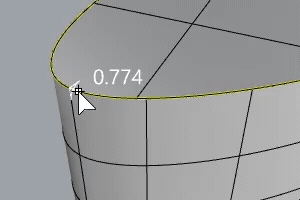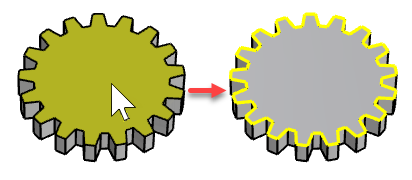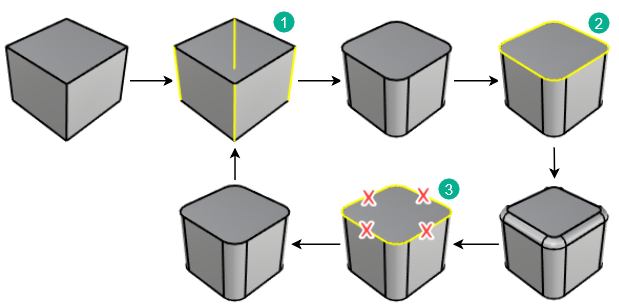FilletEdge
| Toolbar | Menu |
|---|---|
|
|
Solid Fillet Edge > Fillet Edge |
The FilletEdge command creates a tangent surface between polysurface edges with varying radius values then trims and joins the original faces to the fillet surfaces.
|
Input supported |
|---|
|
Steps
-
Select edges.
Or, double-click an edge to select tangent edges.

-
Edit radius handles and options.
Note
- Moving a handle at the end of the edge will cause the fillet to extend beyond the surface. This will have to be trimmed by other means.
- Use window or Shift + mouse click to select multiple handles.
| Command-line options | |
|---|---|
|
ShowRadius |
YesDisplays radius handles in the viewport. NoHides radius handles in the viewport. A hidden radius handle will display when the mouse cursor is close to it. |
|
NextRadius |
Specifies the radius for the next edge. |
|
ChainEdges |
Automatically selects connected edges based on continuity.
|
|
FaceEdges |
Pick a face to select its boundary edges. Tangent edges are excluded.
|
|
PreviousEdgeSelection |
In cases where the command is canceled or ended prematurely, the PreviousEdgeSelection option re-selects the previously selected edges. Supports multiple sets of previously selected edges for up 20 previous edge sets. |
|
TrimAndJoin |
Trims and joins the resulting surface to the input surfaces. History only works if TrimAndJoin=No. |
|
SelectEdges |
Allows selecting more edges after the selection has been closed. |
|
Preview |
Displays a dynamic preview. You can change the options and the preview will update. |
|
Edit |
Edit the most recent selected set of edges. To edit edges
Remove all edges in the most recent edge set to return to the previous edge set.
1) The first edge set. 2) The second edge set. 3) Remove all edges in the second edge set if you need to edit the first edge set. |
The Radius and Distance options appear on the command line when you drag a handle grip.
| Radius/Distance options | |
|---|---|
|
FromCurve |
Select a curve. The radius of the curve at the picked location will be used. |
|
FromTwoPoints |
Pick two points to show the radius distance. |
| Handle options | |
|
AddHandle |
Adds a handle along the edges. |
|
CopyHandle |
Adds a new handle using the distance from the selected handle. |
|
RemoveHandle |
Visible only when at least one handle has been added. |
|
SetAll |
Sets the distance or radius for all handles. |
|
LinkHandles |
Editing a single handle updates all handles. |
Note
-
Only added handles can be removed.
-
The default handles at the ends of each open edge segment cannot be moved or deleted. This is the minimum information the command needs in order to work.
-
The handle at the end of a single closed edge can be moved but not deleted.
-
If a radius is set larger than the edge radius at the handle location, the handle changes to dark red and displays the edge radius. It is the maximum radius allowed at the handle location. In the case below, a radius larger than 3.102 units will fail.

| RailType options | |
|---|---|
|
DistFromEdge |
The distance from the edge curves determines the intersection. |
|
RollingBall |
The radius of a rolling ball determines the intersection. |
|
DistBetweenRails |
The distance between the edge rails determines the intersection. |
Tips
- Always fillet from the largest radius to the smallest radius across a model.
- Remove any edges you can prior to filleting with MergeAllCoplanarFaces or by way of surfacing in a simpler manner. Fewer intersected edges = Fewer problems as the fillet rolls along any edges and tries to trim and join with the adjacent surfaces.
- Make sure there is enough room for the fillet surface to trim and join with adjacent surfaces. The angle relationships between surfaces, sharpness of the bend in the rail around corners and rail type all play a part in any particular case.
See also
Fillet, blend, or chamfer between curves and surfaces


